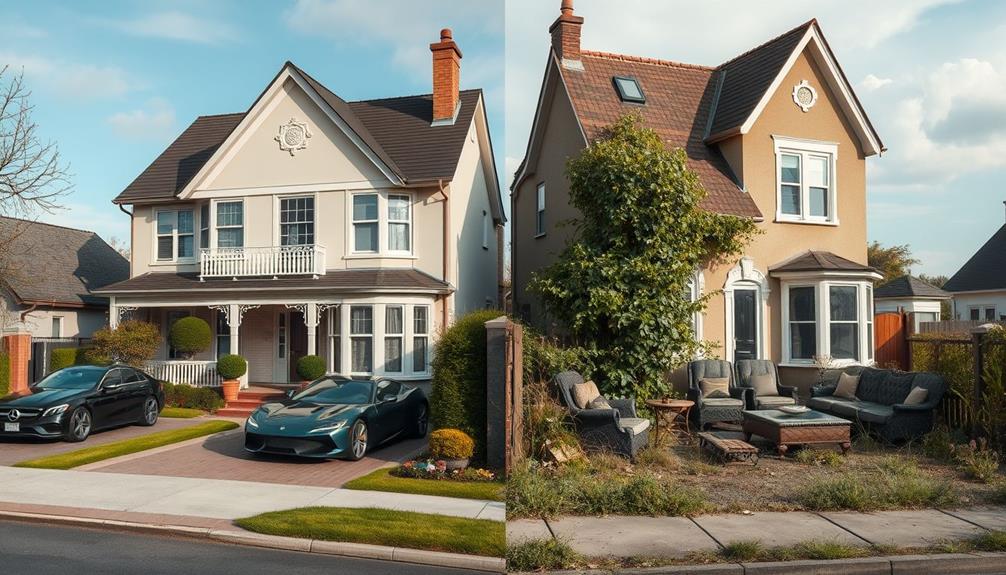In the UK, wealth gaps are glaring, especially when you compare your financial standing to your neighbors. The wealthiest 10% holds about 43% of total wealth, while those aged 30-34 average just £28,000 in wealth compared to £250,000 for those aged 60-64. Regional differences further widen this gap; for instance, household wealth in the South East is £503,400, starkly contrasting with £346,400 in the North East. This disparity can impact not just financial stability but also your outlook on wealth accumulation. Curious about how your situation stacks up? There's much more to explore on this topic.
Key Takeaways
- The wealthiest 10% in the UK control about 43% of total wealth, highlighting stark disparities among neighbors.
- Median wealth for ages 60-64 stands at £250,000, while those aged 30-34 possess only £28,000.
- Homeownership rates differ significantly; 64% in the South East compared to only 20% in the North East, affecting wealth accumulation.
- Degree holders average £478,000 in wealth, while non-degree holders average just £157,000, illustrating educational impact on financial status.
- Rising mortgage interest rates have pushed many into poverty, exacerbating wealth gaps among different age groups and regions.
Understanding Wealth Inequality

Wealth inequality in the UK reveals stark contrasts across different demographics, particularly when you look at age. The wealthiest 10% control around 43% of the total wealth, while the poorest 50% hold only 9%. This stark division highlights significant economic inequalities among age groups.
For instance, individuals aged 60-64 boast a median wealth of £250,000—nine times that of those aged 30-34, who've just £28,000. Understanding the importance of budgeting and saving can play an essential role in bridging these gaps.
Regional wealth gaps further complicate the picture; the median household wealth in the South East of England is £503,400, substantially higher than the £346,400 found in North England. These high levels of economic disparity create barriers to wealth for many, limiting opportunities for upward mobility.
Moreover, income inequality exacerbates wealth distribution issues, with women typically holding £101,000 less than men and individuals with longstanding health issues averaging £65,000 less in wealth.
Understanding these factors is vital in addressing the pervasive wealth inequality that affects so many in Great Britain and exploring solutions to bridge the gaps.
Age-Related Wealth Disparities

As individuals progress through life, their financial situations often reflect significant disparities based on age. The wealth gap between older and younger generations is striking, particularly when you compare the median wealth of those aged 60-64 at £250,000 to just £28,000 for those aged 30-34. This stark contrast highlights the age-related wealth disparities that define economic realities today.
Similar to the emotional instability seen in individuals with Borderline Personality Disorder, younger generations face challenges that can lead to financial anxiety and impulsiveness that hinder wealth accumulation.
Older generations benefit from substantial wealth accumulation, with a mean wealth approaching £1.3 million, while younger generations face increasing economic vulnerabilities. Rising asset prices and challenges in property ownership make it harder for them to establish financial stability.
Moreover, the shift period for achieving upward wealth mobility has extended from 10 to 16 years, indicating that many younger individuals may be struggling longer than their predecessors.
Health issues compound these disparities, as individuals with long-term health challenges average £65,000 less in wealth. This emphasizes the health impact on your financial situation across different age groups.
Understanding these dynamics is essential for steering through the changing landscape of wealth in the UK and recognizing how age influences financial well-being.
Generational Wealth Transfer

While the stark contrast in wealth between older and younger generations may seem overwhelming, understanding generational wealth transfer is crucial for managing these disparities.
The median wealth for those aged 60-64 stands at £250,000, compared to just £28,000 for those aged 30-34, illustrating the significant disparity in wealth accumulation. As younger generations grapple with economic conditions, the wealth transfer period has extended from 10 years to 16 years, making it increasingly difficult to climb the wealth distribution ladder.
Additionally, many younger individuals are exploring alternative investments, such as a Gold IRA rollover, to diversify their portfolios and safeguard their financial futures.
Here are three critical factors affecting generational wealth transfer:
- Economic Pressures: Rising mortgage interest rates have pushed around 320,000 individuals into poverty, complicating financial stability for younger generations.
- Health Issues: Individuals facing long-term health challenges average £65,000 less in wealth, highlighting how health issues impact wealth accumulation.
- Wealth Gap: The ongoing challenges of wealth transfer mean younger individuals encounter obstacles that older generations didn't face, widening the wealth gap.
Addressing these issues is critical for promoting equitable wealth distribution and ensuring financial stability for future generations.
Regional Wealth Differences

When you look at the wealth landscape in the UK, the South East and North East stand out for their stark contrasts.
With homeownership rates and median household wealth differing markedly, it's clear that where you live can greatly impact your financial situation.
This variation is reminiscent of the importance of diversification of retirement portfolio, which can enhance long-term financial security.
Understanding these regional disparities is vital as they contribute to the broader wealth gap across generations.
South East Vs. North
The stark contrast in wealth between the South East and the North of England is hard to ignore.
With a median household wealth of £503,400 in the South East, compared to just £346,400 in the North East, there's a staggering wealth gap of £157,000. This discrepancy highlights significant economic disparities affecting residents' standard of living and opportunities, including financial considerations for elderly care that can vary greatly between these regions.
Here are three key factors contributing to this inequality:
- Homeownership Rates: In the South East, 64% of residents own homes, while only 20% in the North East enjoy the same. This difference drastically affects household wealth accumulation.
- Property Values: The South East's property market thrives, with higher values bolstering wealth. Conversely, the North East's lower property values hinder wealth growth, further deepening regional wealth gaps.
- Average Individual Wealth: The average individual wealth in the South East stands at £236,000, showcasing how regional wealth distribution varies and limits economic mobility for those in the North.
Understanding these factors can shed light on the broader socio-economic challenges faced in the UK today.
Homeownership's Wealth Impact
Homeownership greatly influences wealth accumulation, particularly when comparing regions like the South East and the North East. The stark differences in homeownership rates and property wealth create a significant wealth gap that impacts financial stability for many.
| Region | Homeownership Rate | Median Household Wealth |
|---|---|---|
| South East | 64% | £503,400 |
| North East | 20% | £346,400 |
| Wealth Gap | £157,000 |
In the South East, higher homeownership rates correlate with greater median household wealth, while the North East faces a disheartening reality. With only 20% of residents owning homes, renters struggle with lower wealth accumulation and limited opportunities. This regional disparity highlights the wealth concentration in property assets, emphasizing the need for targeted policies to bridge the gap.
For you, understanding these dynamics can spark a desire for change. Whether you're a homeowner or a renter, awareness of how regional wealth differences affect you can motivate action towards greater financial stability and opportunities. The journey towards equity in homeownership starts with recognizing these disparities.
Impact of Education

When you consider your wealth, education plays an essential role in shaping your financial future. Those with higher education often find themselves in managerial positions, reaping rewards that routine jobs simply can't match.
Furthermore, careers in fields like AI software engineering and cybersecurity are increasingly lucrative, demonstrating the value of specialized education in emerging technologies AI Software Engineer Jobs.
Plus, your family's background can influence your opportunities, highlighting the need for equitable access to education for all.
Education's Wealth Correlation
Education plays an essential role in determining your financial future. The correlation between education and wealth is striking and can't be ignored. Individuals with higher education greatly accumulate wealth, averaging £478,000 for degree holders compared to £157,000 for those without qualifications. This disparity illustrates the impact of educational attainment on your economic well-being.
Additionally, setting clear and specific objectives in your educational journey can enhance your focus and drive towards financial success, which aligns with effective goal tracking.
Here are three key points to reflect on:
- Higher Income Potential: Higher education often leads to better job opportunities and higher income, contributing to greater financial stability.
- Long-term Wealth Accumulation: A bachelor's degree or higher not only improves your immediate income but also enhances your long-term wealth accumulation, reflecting the value of investing in your education.
- Parental Influence: If your parents owned their home while you were a teenager, you likely have £47,000 more wealth than those whose parents rented, showcasing how socioeconomic status can shape educational opportunities and future financial prospects.
Managerial Roles Vs. Routine
In today's job market, the divide between managerial roles and routine occupations is stark, with wealth disparities that reflect the significance of educational attainment. Individuals in managerial positions possess nearly 12 times the wealth of those in routine jobs. This vast wealth gap highlights how your educational background directly influences your financial status and wealth accumulation.
| Job Type | Average Wealth | Sector |
|---|---|---|
| Managerial Roles | £478,000 | Public Sector |
| Routine Occupations | £157,000 | Private Sector |
| Higher Education | Increased Wealth | Various Sectors |
| Lower Qualifications | Limited Growth | Routine Roles |
Individuals with higher education generally enjoy better job opportunities and financial stability. Employment in the public sector offers advantages, like pension contributions, leading to greater wealth compared to the private sector. The wealth gap between those in managerial roles and routine occupations underscores the importance of educational attainment and socioeconomic status in determining financial success. By prioritizing education, you can enhance your job type and, ultimately, your financial future.
Parental Influence on Wealth
While many factors contribute to wealth accumulation, parental influence plays a vital role, especially regarding education. Your parents' socioeconomic background can determine the educational opportunities available to you, impacting your future financial security.
This influence is evident across various stages of development, where key domains of development in psychology highlight how early experiences shape lifelong outcomes. Here's how:
- Property Ownership: If your parents owned their home during your teenage years, you could see an average wealth boost of £47,000 compared to those whose parents rented. This shows the long-term impact of parental property ownership on wealth accumulation.
- Higher Education: Attaining higher education is essential. Degree holders average £478,000 in wealth, while those without qualifications only see £157,000. This stark contrast highlights the importance of educational attainment.
- Networking Opportunities: Children from educated families often have better access to networking opportunities, leading to more lucrative job prospects. This access can appreciably narrow the wealth gap you might face compared to peers from less privileged backgrounds.
In essence, your journey towards financial security is intricately linked to your parental influence, shaping your educational paths and, ultimately, your wealth.
Understanding this connection can empower you to navigate your financial future more effectively.
Strategies for Wealth Growth

To effectively grow your wealth, focus on strategies that prioritize income-generating investments and shift your mindset from merely cutting expenses to enhancing your quality of life through experiences.
Consider diversifying your portfolio by including precious metals, which can act as a hedge against inflation and economic downturns, similar to trusted Gold IRA options. Wealth creation isn't just about saving; it's about making your money work for you.
Consider investing in assets that provide returns, like real estate or stocks, which can contribute to your financial stability.
Higher education plays a significant role in wealth accumulation. Individuals with degrees often hold an average wealth of £478,000, markedly higher than those without qualifications.
Your job type can also impact your financial success—higher managerial roles yield nearly 12 times the wealth of routine jobs.
Networking is vital; building connections can reveal financial opportunities that may lead to better job prospects and investment insights.
Don't underestimate the power of relationships in your economic journey.
Lastly, commit to continuous learning. Understanding the interplay between income and wealth enhances your financial planning, helping you adapt to changing markets and seize opportunities as they arise.
Frequently Asked Questions
How Much Wealth Is Considered Rich in Uk?
In the UK, you're often considered "rich" if your household wealth exceeds the median, typically around £500,000. This threshold signifies substantial financial security, distinguishing you from many others in the population.
Is the Wealth Gap Getting Worse in the Uk?
Yes, the wealth gap's getting worse in the UK. You'll notice rising asset prices and declining homeownership rates impact younger generations greatly, while the richest continue to accumulate wealth, deepening systemic disparities.
What Age Group Controls the Most Wealth?
You'll find that individuals aged 60-64 control the most wealth, boasting a median of £250,000. Their long-term asset accumulation starkly contrasts with the considerably lower wealth of those aged 30-34, highlighting generational disparities.
Who Owns Most of the Wealth in the Uk?
You might think wealth is evenly spread, but the wealthiest 10% of households in the UK actually control about 43% of it, leaving the poorest half with just 9%. It's a striking imbalance.
Conclusion
In the grand tapestry of life, wealth isn't just a number; it's the thread that weaves together opportunity and security. As you stand at the crossroads of age and fortune, remember that understanding your financial landscape can illuminate the path to prosperity. With the right strategies, you can bridge the wealth gap and rise above your neighbors, turning the tide in your favor. Don't let the shadows of inequality dim your future—seize the chance to thrive!










